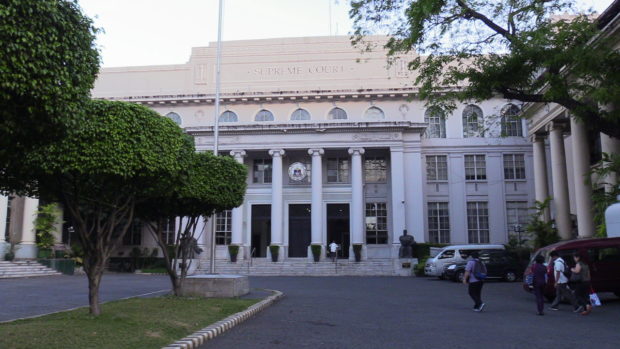Longer detention of suspected terrorists needed to build up case, gov’t lawyer tells SC

Oral arguments on the Anti-Terrorism Act resumed on Tuesday, April 27, 2021, at the Supreme Court. (File photo by CATHY MIRANDA / INQUIRER.net)
MANILA, Philippines — A person suspected of having terrorist ties needed to be detained for a prolonged period of 24 days to give law enforcers more time to build up a case, Assistant Solicitor General Marissa de la Cruz-Galandines told the Supreme Court on Tuesday at the resumption of the oral arguments on the Anti-Terrorism Act (ATA) of 2020.
Galandines was referring to the provision of that law allowing a terrorism suspect to be detained for 14 days without charge, with the period extendible up to 24 days.
“Congress, in passing the ATA realized that the three-day period for building up an anti-terror case is not sufficient,” Galandines said.
Supreme Court Associate Justice Rosmari Carandang asked if the 24-day detention period would not violate the Constitution — particularly Article VII, Section 18, a portion of which provides for a maximum detention period of three days during the suspension of the privilege of the writ of habeas corpus. Under the Constitution, a suspect arrested but not charged within three days should be released.
“It is our submission that the constitutional provision applies only to insurrection, rebellion, or invasion. It does not apply to other crimes because Congress can pass a law setting period of detention,” Galandines said.
Article continues after this advertisementAccording to Galandines, a suspect not charged after 24 days under the ATA could walk free “immediately.”
Article continues after this advertisementOn Surveillance
Galandines said authorities would need authorization from the Court of Appeals before conducting surveillance on people with suspected terrorist ties.
However, she admitted that the basis for such a request would be informal surveillance conducted by government agents.
The findings of the informal surveillance, she said, would be contained in the intelligence report. It will then be submitted to the Court of Appeals.
“That is why we will divulge this before the Court of Appeals so that we would be able to secure a written consent before we conduct the [formal] surveillance,” she said.
“Is the government not violating any rules on right to privacy because they are conducting informal surveillance?” Carandang asked.
Galandines said “no,” because it would then be a matter of “national security.”
She said the evidence gathered during the formal surveillance could lead to a “designation” — which under the ATA is a distinct power of the Anti-Terrorism Council to tag a person as a terrorist without going through a court process.
According to Galandines, the effect of designation is the freezing of the assets of the suspects or the organization involved, but no arrests will be made.
“No arrest for designation. Are you sure of that?” Carandang asked.
Galandines replied: “It is without prejudice to the eventual filing of an action for proscription.”
Effects on a detained suspected terrorist
“Will the evidence gathered by the Anti-Terrorism Council to be able to get a designation different or the same in filing a case against him for either Section 6 (planning, training, preparing and facilitating the commission of terrorism), Section 7 (conspiracy to commit terrorism) or Section 9 (inciting to commit terrorism)?” Carandang asked.
“Yes, there would… May I…” Galandines said.
But Carandang interrupted her, saying: “I think you are not ready to answer this. But I think the question of the court is very clear.”
She told Galandines to clarify it in their memorandum that would be submitted upon the conclusion of the oral arguments.
The oral arguments will resume next week.